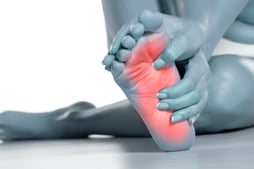What is Diabetic Neuropathy?
Diabetic neuropathy is nerve injury due to diabetes. This can affect sensory nerves, nerves that control motor function (movement), and/or autonomic nerves (nerves that control heart rate, blood pressure, gastrointestinal function, and more). With as many as 50% of diabetics getting diabetic neuropathy, it is a common problem.
Who is at Risk?
People with Diabetes Type 1 for more than 5 years are at risk. Anyone with Diabetes Type 2 is at risk, regardless of the duration. This is because people have frequently had prediabetes or diabetes for many years, and damage to the nerve fibers had been going on before they were formally diagnosed with diabetes.
Could My Neuropathy Be From Something Else?
Even if you have diabetes, there are many other causes of neuropathy such as Vitamin B12 Deficiency, infections, autoimmune diseases, kidney disease, liver disease, thyroid disease, alcoholism, and trauma. Other causes may need specific treatment, so they should be excluded before diagnosing the problem as diabetic neuropathy.
What are the Common Signs & Symptoms of Diabetic Neuropathy?
Although there are others, there are 3 common types of neuropathy:
Sensory Neuropathy:
This affects regular sensation to touch, vibration, and temperature. Feet are most frequently affected, but neuropathy can also affect the legs and the hands.
- Problems with these nerves can cause pain, tingling, burning, and decreased or absent sensation.
- Consequences of decreased sensation:
- Wounds on your feet that you don’t know about. If realization of a wound is delayed, the wound can become more serious and can even result in the need for amputation. (This is why diabetics are advised to visually check their feet every day).
- We need sensation to know where we are putting our feet. With decreased sensation, you are at risk for tripping and falling.
- Sensation can also be altered so normal things are perceived as painful.
Motor Neuropathy:
- If the motor nerves do not work properly, weakness and problems with coordination result. This can cause difficulty walking as well as tripping and falling.
Autonomic Neuropathy:
Autonomic nerves are the part of the nervous system that controls automatic functions. Symptoms include:
- Orthostatic hypotension (a drop in blood pressure). This occurs if the mechanisms that rapidly adjust heart rate, blood pressure and vascular tone in response to position changes don’t work properly. This can result in dizziness, light-headedness, falling, and fainting when getting up from lying or sitting.
- Gastroparesis; when the stomach does not empty properly. This can cause nausea, vomiting, and bloating. If the nerves in the intestines are involved, you can get constipation, diarrhea, and incontinence.
- Difficulty with vision when changing from far to near or light to dark. (This is separate from diabetic retinopathy which is not covered in this blog).
- Trouble emptying the bladder or urinary leakage.
- Erectile dysfunction in men and vaginal dryness in women.
- Diabetic Hypoglycemic Unawareness where you do not have warning symptoms of low blood sugar such as shakiness, sweating, hunger, or racing heartbeat. Knowing your blood sugar is low is important so you can take action to bring it up and prevent your sugar from becoming dangerously low.
What are the Risk Factors for Developing Severe Diabetic Neuropathy?
- Poor control of diabetes
- Hypertension or elevated blood pressure
- High cholesterol
- Smoking
- Heavy alcohol consumption
- Longer duraton of diabetes
How is Diabetic Neuropathy Diagnosed?
A physical exam and blood tests are usually done to rule out other causes. In cases that are either very severe, unclear, or complicated, an EMG (electromyogram) and consultation with a specialist might be ordered.
How do I Treat Diabetic Neuropathy?
The best treatment is prevention! Control your diabetes (the Hemoglobin A1c goal for most people is less than 7.0%). It is also important to control blood pressure and cholesterol, quit smoking if you smoke, limit alcohol, eat healthy, and get plenty of exercise. These same things can slow the progression of diabetic neuropathy if you already have it.
Treatment is geared toward symptoms and is not curative. Some examples:
- Pain from sensory neuropathy can be treated with medicines such as Duloxetine (Cymbalta), Gabapentin, and Pregabalin (Lyrica) and supplements such as alpha-lipoic acid. Nerve blocks can be done for certain symptoms. Relaxation techniques, biofeedback, hypnosis, meditation, and superficial nerve stimulation with a portable TENS unit are other treatments.
- Weakness and loss of position sense due to numbness can be helped with physical therapy.
- Orthostasis (drop in blood pressure with change in position), can be treated with getting up slowly, an increase in fluid intake, compression stockings, and medications such as Midodrine depending on the severity of the case.
- Urinary and gastrointestinal symptoms can also be helped with medication.
Clinical Trials
Chase Medical Research has experience in conducting trials for diabetic neuropathy and many other diseases. If you are interested in participating in one of our trials, please check out our website for currently enrolling trials. One of our current trials is for an investigational medication for diabetic neuropathy.
References:
- Myron A. Bodman; Matthew Varacallo., Peripheral Diabetic Neuropathy, NIH, National Library of Medicine, Last Update: September 29, 2022.
- Quan, D., 2020, Diabetic Neuropathy, Medscape, Jan. 17, 2020.
- Khardori, R., 2020, Type 2 Diabetes Mellitus Overview, Medscape, May 28, 2020.
- Diabetes Care, January 2019, Volume 42, Supplement 1.
Share This Post
Recent Posts
- The Relationship Between Obesity and Obstructive Sleep Apnea March 2 2023
- Cardiovascular Outcome Clinical Trials March 2 2023
- Diabetic Peripheral Neuropathic Pain March 2 2023
- Are All Types of Cholesterol Bad? March 2 2023
- Blood Pressure: The Highs, the Lows, and Everything in Between March 2 2023
Categories
- Clinical Trials
- Cardiovascular Disease
- Diabetes
- Obesity
- Kidney Disease
- Hypertension
- Pain Management
- Vaccine
- Cholesterol
- Chronic Obstructive Pulmonary Disease
- Diabetic Peripheral Neuropathy
- Migraine
- Osteoarthritis
- Biologics
- COVID-19
- Gastroesophageal Reflux Disease
- Irritable Bowel Syndrome with Constipation
- Lyme Disease
- Nonalcoholic Steatohepatitis
- Respiratory Syncytial Virus


